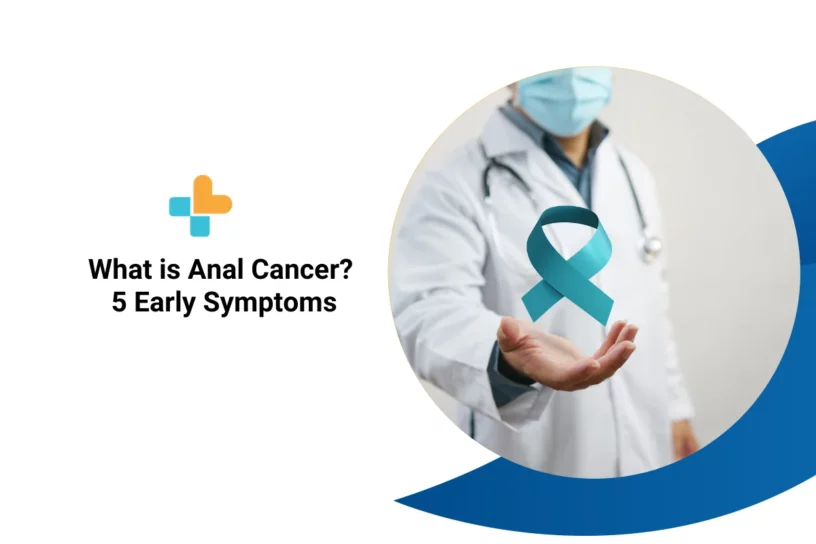Did you know that anal cancer, though rare, is a significant health concern? According to the National Institutes of Health (NIH), in 2023, an estimated 9,760 new cases were found, accounting for 0.5% of all new cancer cases. There has been a notable increase in reported cases over the past decade.
Recognizing the early symptoms is crucial in timely diagnosis and effective treatment.
This blog will explore the five early symptoms of anal cancer, risk factors, and preventive strategies.
Understanding Anal Cancer
Anal cancer is a relatively rare form of cancer that affects the tissues of the anus. It is often associated with certain risk factors like HPV infection, engaging in receptive anal sex, and having a weakened immune system.
Regular screenings are crucial for early detection, leading to better treatment outcomes.
Now that we have explored the basics of anal cancer, let’s delve into the various types of this disease that can occur in individuals.
Types of Anal Cancer
Anal cancer can manifest in different forms, depending on the specific cells involved. Here are three kinds of anal cancer:
- Squamous cell carcinoma: This is the most common type of anal cancer originating from the squamous cells lining the anus.
- Basal cell carcinoma: A less common type, basal cell carcinoma develops from the basal cells of the anal skin.
- Adenocarcinoma: This type of anal cancer arises from the epithelial cells lining the anus.
Now that we have explored the basics of anal cancer and its types, let’s delve into the anal cancer symptoms that can aid in timely detection and intervention.
5 Early Symptoms of Anal Cancer
Recognizing the early symptoms of anal cancer is crucial for early detection and effective treatment.
While these symptoms may not always indicate anal cancer, it is important to pay attention to any persistent changes in your anal area and seek medical advice if you experience the following:
- Persistent anal itching or discomfort
- Changes in bowel habits
- Bleeding or discharge from the anus
- Pain or pressure in the anal area
- Presence of a lump or mass near the anus
Now that we have discussed the early symptoms of anal cancer, let’s delve into the risk factors associated with this condition and understand the importance of regular screenings for early detection.
Risk Factors for Anal Cancer
Understanding the risk factors for anal cancer is important for early detection and anal cancer prevention. The following are the common risk factors for anal cancer.
1. Infection with Human Papillomavirus (HPV)
Certain strains of HPV, especially high-risk types like HPV-16 and HPV-18, significantly increase the risk of anal cancer. Engaging in unprotected sexual activity or having multiple sexual partners raises the risk. Getting vaccinated against HPV and undergoing regular screenings and HPV testing are essential preventive measures.
2. Engaging in Receptive Anal Sex
Individuals participating in receptive anal sex are at greater risk of developing anal cancer. This activity’s friction and harm can result in the development of abnormal cells in the anal canal. Safe sex, particularly using condoms, can help lower the risk. Regular check-ups and screenings are critical for detecting receptive anal sex at an early stage.
3. Weakened Immune System
A compromised immune system increases the vulnerability to anal cancer. Conditions like HIV/AIDS, organ transplantation, or chronic immunosuppressive therapy weaken the immune system’s ability to combat infections and abnormal cell growth.
Regular medical check-ups and adhering to the healthcare provider’s advice for immune system support are crucial. A healthy lifestyle involving a balanced diet, exercise, and stress management improves the immune system.
Now that we have explored the risk factors associated with anal cancer, let’s delve into the important aspect of screening and diagnosis for early detection and effective management of this condition.
Screening and Diagnosis
Regular screening of anal cancer is essential for early detection, rapid treatment, and better outcomes. The following are the anal cancer screening methods and the diagnostic process.
1. Screening Methods for Anal Cancer
The following screening methods are used by healthcare practitioners to detect anal cancer at an early stage.
- High-resolution anoscopy (HRA): HRA involves a thorough examination of the anal canal using a specialized microscope. It enables healthcare providers to identify any abnormal tissue that may indicate the presence of anal cancer.
- Anal Pap smear: Like a Pap smear for cervical cancer, an anal Pap smear involves collecting cells from the anal canal. This test helps detect precancerous or cancerous changes in the cells.
- Other screening approaches: Additional screening methods, such as DNA testing for high-risk forms of the human papillomavirus (HPV), are being explored. These tests aid in early detection and prevention of anal cancer.
2. Diagnostic Process
The following diagnostic process begins when suspected indicators of anal cancer are identified during screening or in response to symptoms.
3. Medical History and Physical Testing
An in-depth review of the patient’s medical history helps healthcare practitioners determine risk factors and symptoms. Physical testing is then performed to evaluate any abnormalities in the anal region.
4. Biopsy
If abnormalities are detected, a biopsy is conducted to confirm the presence of cancer cells. A small tissue sample is taken from the affected area for laboratory analysis during this procedure.
5. Imaging Tests
Imaging tests such as CT scans, MRI scans, or PET scans may be recommended to determine the stage and spread of anal cancer. These tests provide detailed images that aid in treatment planning.
After understanding the screening and diagnosis, let’s delve into the various stages of anal cancer and understand their implications in determining the appropriate treatment.
Stages of Anal Cancer
Anal cancer is classified into stages based on the extent of its spread. The staging system helps healthcare professionals determine each patient’s most appropriate treatment approach. The following are the stages of anal cancer:
- Stage 0: The cancer cells are only found in the surface layer of the anal tissue, which is also known as carcinoma in situ.
- Stage I: The cancer has grown deeper into the anal tissue but has not spread to nearby lymph nodes or other organs.
- Stage II: The cancer spreads nearby to lymph nodes but not to distant organs.
- Stage III: The cancer has progressed to nearby lymph nodes and may have infiltrated nearby structures or organs.
- Stage IV: Through the lymphatic system or circulation, the cancer has spread to other organs such as the liver, lungs, or bones.
Now that we understand the stages of anal cancer let’s explore the available anal cancer treatment options for managing this condition effectively.
Treatment Options for Anal Cancer
When treating anal cancer, various options are available depending on the stage and extent of the disease. The following are some effective treatment approaches to consider:
- Surgery: Surgical treatment commonly removes cancerous tissue from the anus and nearby lymph nodes.
- Radiation therapy: This therapy involves directing high-energy radiation at the affected area to eliminate cancer cells and shrink tumours.
- Chemotherapy: This treatment uses powerful medications, either orally or intravenously, to destroy cancer cells throughout the body.
- Immunotherapy: This therapeutic strategy targets and attacks cancer cells using the body’s immune system.
Now that we have discussed the treatment options, let’s delve into valuable coping strategies to help individuals navigate their anal cancer journey with support and resilience.
Coping with Anal Cancer
Navigating a diagnosis of anal cancer can be a challenging journey, but several coping tactics and resources are available to help you through this difficult time. The following are some coping tactics and resources:
- Seek emotional support from family and friends, and participate in support groups.
- Use stress-reduction practices like meditation or yoga.
- Keep current on treatment alternatives and take an active role in decision-making.
- Eat a well-balanced diet and exercise often to maintain a healthy lifestyle.
- Engage in activities that provide you delight while also improving your overall health.
Now that we have explored coping strategies, let’s delve into the crucial topic of prevention and risk reduction for anal cancer.
Prevention and Risk Reduction
Certain precautions can be taken to lower the risk of developing anal cancer, which in turn positively impacts the anal cancer survival rate. The following are the strategies individuals can consider to prioritize their health and well-being:
- Get vaccinated against human papillomavirus (HPV)
- Practice safe sexual behaviours
- Regular screenings and check-ups
- Maintaining a healthy diet
- Exercising regularly
- Avoid tobacco and excessive alcohol consumption
Your Partner in Achieving a Pain-Free and Healthy Life
Promptly recognizing the early symptoms of anal cancer and understanding anal cancer causes, such as HPV infection and engaging in receptive anal sex, is crucial. By adopting preventive measures like HPV vaccination and safe sex practices, the risk of developing anal cancer can be reduced.
Regular screenings are essential for early detection, enabling timely intervention. Ayu Health is committed to helping people on their path to living a healthy and pain-free life. Ayu Health is here to provide personalized solutions and prioritize your well-being if you have problems or need help. Visit Ayu Health today to take the first step towards a healthier tomorrow.
Also Read : Stomach Cancer: Risk Factors, Treatment, and Support
FAQs
1. Can Anal Cancer be Prevented?
A: While it may not be completely preventable, certain measures such as HPV vaccination, safe sexual practices, and a healthy lifestyle can help reduce the risk of developing anal cancer.
2. Are There Any Long-Term Effects or Complications Associated with Anal Cancer Treatment?
A: Treatment for anal cancer can have potential long-term effects such as changes in bowel habits, sexual dysfunction, and psychological impact. However, healthcare professionals can provide support and guidance to manage these effects and improve quality of life.
3. Is Anal Cancer Hereditary?
A: Anal cancer is not typically considered a hereditary disease. However, having a family history of certain genetic conditions or cancers may increase the risk of developing anal cancer.
4. Can Anal Cancer Spread to Other Parts of the Body?
A: Anal cancer can potentially spread (metastasize) to nearby lymph nodes and other distant organs such as the liver or lungs. Early detection and treatment play an important role in preventing or managing the spread of cancer.
5. What is the Prognosis for Anal Cancer?
A: The prognosis for anal cancer varies depending on several factors, including the stage at diagnosis, the overall health of the individual, and response to treatment. With advancements in medical care, early detection, and appropriate treatment, the prognosis for anal cancer has significantly improved in recent years.
Our Hospital Locations
Oncology Surgery Hospitals in Bangalore | Oncology Surgery Hospitals in Jaipur | Oncology Surgery Hospitals in NCR | Oncology Surgery Hospitals in Hyderabad
Our Doctors
Oncology Surgery Doctors in Bangalore | Oncology Surgery Doctors in Jaipur | Oncology Surgery Doctors in NCR | Oncology Surgery Doctors in Hyderabad
References:
https://seer.cancer.gov/statfacts/html/anus.html
https://www.ncbi.nlm.nih.gov/pmc/articles/PMC5805865/
https://www.ncbi.nlm.nih.gov/pmc/articles/PMC10174401/
https://acsjournals.onlinelibrary.wiley.com/doi/pdf/10.1002/cncr.25909
https://pubmed.ncbi.nlm.nih.gov/19689440/
https://ayu.health/blog/importance-of-preventive-health-check-ups-in-maintaining-good-health/




